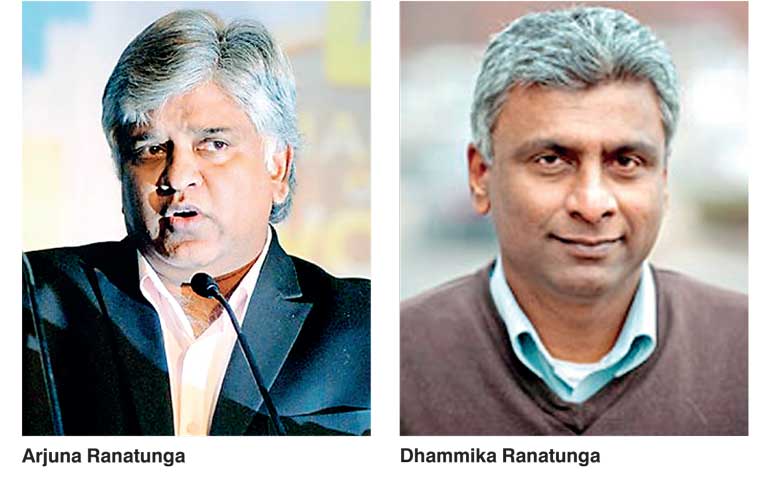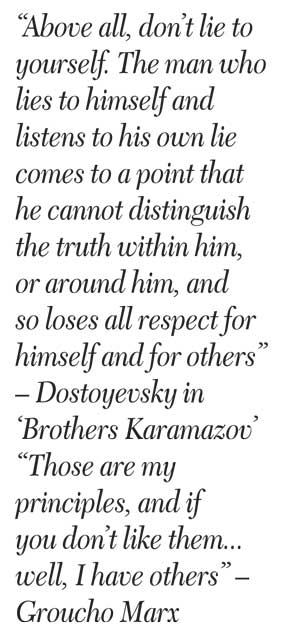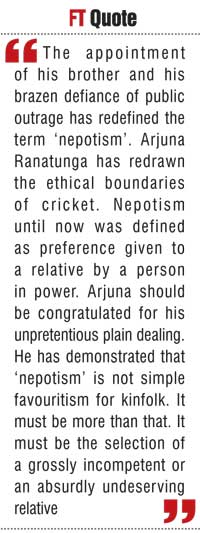Friday Feb 13, 2026
Friday Feb 13, 2026
Thursday, 29 October 2015 00:00 - - {{hitsCtrl.values.hits}}

 Good governance go by the board. The Ranatunga brothers have sailed into Port and dropped anchor. The morals of cricket are gone. Lunacy of the sport lingers on. The crowd pleasing, crowd drawing capacity of cricketers can get them elected. When elected, they leave behind ‘fair play’ and ‘level playing field’ on entering Parliament.
Good governance go by the board. The Ranatunga brothers have sailed into Port and dropped anchor. The morals of cricket are gone. Lunacy of the sport lingers on. The crowd pleasing, crowd drawing capacity of cricketers can get them elected. When elected, they leave behind ‘fair play’ and ‘level playing field’ on entering Parliament.
Fairness implies treating everyone equally and impartially. Fair play in cricket is to conduct oneself in accord with the spirit of the sport.
Arjuna’s shameless appointment of brother Dhammika as the Head of the Ports Authority confirms an empty barn under that thatched roof of silvery hair. It is utterly devoid of any moral content. The latest exploit of the World Cup winning captain now turned ‘Yahapalana’ Minister reminds us of the famous story of Dr. William Gilbert Grace. When he was clean bowled, he calmly picked up the bails and placed them on the stumps. He pointed to the adoring crowds and told the bowler: “They didn’t come to watch you bowl. They came to watch me bat.”
True. Cricket in this country has fallen prey to practitioners of ‘win or place’ for some time. Turf accountants have taken over the score board and that is unlikely to change any time soon.
Gone are the days when we condemned public impropriety with the phrase “It’s not cricket”. Cricket has ceased to be a gentleman’s sport. In Sri Lanka today, cricket it only an entrée in political banquets politics where the main meal is often a chunk of steak from the nation’s exchequer.
Cricket was once a game that insisted on a universal code of moral values such as fair play, abiding by rules, good sportsmanship and integrity of the umpire. The Victorian era sahibs thought cricket as a good conduit in teaching morals to the masses. It is in such a milieu that the nation watched first in awe and later with adulation the phenomenon of the Ranatunga brothers learning and mastering the game of cricket.
They brought renown and fame to the institution founded by pioneers Olcott and Leadbeater. Their success in the gentleman’s game drove none elite Lankans to paroxysms of ecstasy when watching vernacular speaking commoners surpassing the gentleman from those under the care of clergymen – De Saram and Fraser.
They were acclaimed for their adherence to the dictum ‘Appamado Amatha Padam’ – Diligence leads to perfection. But diligence in what?
Today the stellar stalwart produced in the traditions of Leadbeater has beaten the lead out of all.
The Minister of Ports Arjuna Ranatunga is undoubtedly the most outstanding of the ‘Ranatunga’ frères. He is the Dimitri of the cricketing clan from the Siyane Korale. Just as Dostoevsky’s ‘Dimitri’, he wanted to do things right. He was just uncertain about what that right way was. He is also the ‘Groucho’ of the Marx siblings chosen to act as Captain Spalding!
The appointment of his brother and his brazen defiance of public outrage has redefined the term ‘nepotism’. Arjuna Ranatunga has redrawn the ethical boundaries of cricket. Nepotism until now was defined as preference given to a relative by a person in power. Arjuna should be congratulated for his unpretentious plain dealing. He has demonstrated that ‘nepotism’ is not simple favouritism for kinfolk. It must be more than that. It must be the selection of a grossly incompetent or an absurdly undeserving relative.
The ESPN cricinfo website describes Dhammika Ranatunga as “the eldest of three brothers to represent Sri Lanka at Test level. He has had the briefest sojourn in the international arena. He is described as a stoic opening batsman unsurprisingly blessed with an unflappable temperament.” [http://www.espncricinfo.com/srilanka/content/player/50245.html]
His stoicism and unflappable temperament should serve him well in his undeserved, unearned assignment as the head of the Ports Authority.
A politician can either be ahead or behind public opinion. But when they claim that public opinion is with them and proceed to flouts it brazenly, such should be condemned in the most unequivocal terms.
Arjuna Ranatunga played a critical role in the 21 November Movement that bought about the 8 January revolution. We do not know why he did it. What we do know is that the people believed him and he has been rewarded with ministerial office.
Immediately after the Parliamentary elections our preachy President assured the nation that appointments to positions of authority would be filtered by him and Prime Minister Ranil Wickremesinghe. Therefore it is reasonable to conclude that the appointment of brother Dhammika must have been cleared by both President Sirisena and Premier Wickremesinghe. The nation however has a right to know the compelling reason that made them appease the ambitions of the Ranatunga frères.
More than ever before, we need our politicians to regain their standing with the public. They must begin to regard voters and citizens as something much more than morons. It is true that there is a substantial segment that is easily gulled. Yet the 8 January spontaneity has demonstrated that it is fast receding.
The voters of the Gampaha District are not knaves. Yet, two brothers, who claimed moral superiority from two different and opposing settings, entered Parliament.
How did they manage it? The virtue in public life is not found in our understanding of virtue. The political success of the Ranatunga clan has less to do with their political genius and more with our own “vulgar ethics”.
Our public morals have no links to moral rules and moral conduct. Moral behaviour is dependent on our ability to engage in collective self-discovery and determining what kind of people we should be.
The success of the 8 January movement depends on our ability to dislodge the cricketing knight from his high horse and the speed with which we do it.
President Maithripala Sirisena should not confine himself to Mandela and Gandhi. Busy as he is, he should include Abe Lincoln in his bedtime reading. “Public sentiment is everything. With public sentiment nothing can fail; without it nothing can succeed. He who moulds public sentiment goes deeper than he who enacts statutes or decisions possible or impossible to execute.”